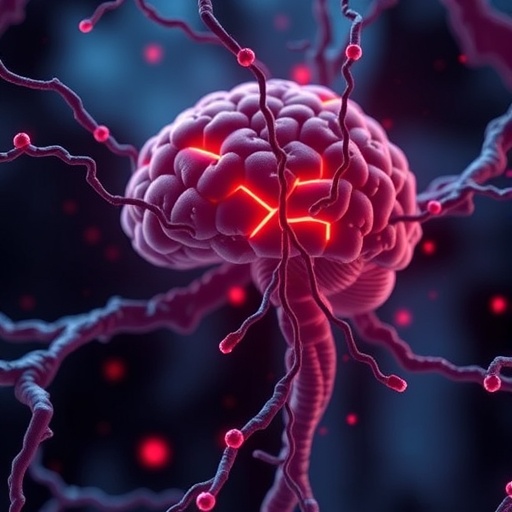In recent years, mounting evidence has highlighted the intricate connections between the gastrointestinal system and brain function, particularly in the context of psychiatric disorders. A groundbreaking study published in BMC Psychiatry delves into this gut–brain axis, exploring how intestinal permeability and genetic factors may influence mood disorders such as bipolar disorder and major depressive disorder. This research provides compelling insights into serum zonulin levels—a key regulator of intestinal permeability—and the role of the rs2070937 polymorphism, shedding light on potential biological underpinnings of these complex mental health conditions.
The investigation stems from the recognition that mood disorders often resist full explanation by traditional neurochemical theories alone. Chronic inflammation has emerged as a vital piece of this puzzle, with the gut increasingly implicated as a critical mediator. The intestinal barrier controls the passage of substances from the gut lumen into the bloodstream; disruption of this barrier, often termed “leaky gut,” allows pro-inflammatory molecules to enter systemic circulation, potentially influencing brain function and behavior. Zonulin, a protein known to modulate tight junctions between intestinal epithelial cells, plays a pivotal role in maintaining this barrier’s integrity.
In this study, researchers recruited 47 individuals diagnosed with bipolar disorder, 56 with major depressive disorder, and a control group of 51 healthy subjects. Utilizing comprehensive clinical assessments including the Young Mania Rating Scale and the Hamilton Depression Rating Scale, they meticulously characterized symptom severity. Blood samples collected from all participants enabled the precise measurement of serum zonulin levels along with genotyping for the rs2070937 polymorphism, a genetic variant speculated to impact inflammation and barrier function.
The results revealed that both bipolar and major depressive disorder patients exhibited significantly elevated serum zonulin concentrations relative to healthy controls. This finding strongly suggests an increased intestinal permeability in these populations, aligning with the notion that systemic inflammation and gut barrier dysfunction are intertwined with mood pathology. Interestingly, the study detected no significant differences in serum zonulin between the two psychiatric groups, indicating a potentially shared pathophysiological mechanism underlying these distinct diagnoses.
Further genetic analysis of the rs2070937 polymorphism, categorized into AA, AG, and GG genotypes, demonstrated no meaningful variation in zonulin levels within genotype subgroups. Moreover, the distribution of these genotypes did not differ significantly across the bipolar disorder, major depressive disorder, and control groups. This evidence points to a complex interplay where the polymorphism itself might not directly mediate zonulin regulation or disease susceptibility, underscoring the multifactorial etiology of mood disorders.
The implications of this research extend beyond academic curiosity, illuminating pathways that could revolutionize clinical practice. Recognizing the gut–brain axis’s role emphasizes the importance of screening for intestinal barrier integrity in psychiatric assessments. Elevated zonulin may serve as a biomarker for identifying patients at risk of heightened inflammatory states associated with mood dysregulation. Such biomarkers could herald the advent of precision psychiatry, where treatment is tailored based on individual biological profiles.
Moreover, these findings invigorate the exploration of novel treatment strategies targeting the gut barrier and microbiota composition. Interventions ranging from dietary modifications to probiotic supplementation could attenuate intestinal permeability, thereby mitigating systemic inflammation and possibly alleviating psychiatric symptoms. This integrative approach promises to complement existing pharmacological and psychotherapeutic modalities, enhancing patient outcomes.
It is important to contextualize these results within the broader framework of neuropsychiatric research. While the elevation of serum zonulin supports the hypothesis of increased gut permeability, the exact causal relationships remain to be elucidated. The cross-sectional design of the study limits conclusions about temporal dynamics; future longitudinal research is essential to determine whether barrier dysfunction precedes mood episodes or arises as a consequence.
Additionally, the lack of association between the rs2070937 polymorphism and zonulin levels or mood disorders invites further investigation into genetic modifiers of gut barrier function. The complexity of gene-environment interactions, epigenetic influences, and other polymorphisms must be addressed to fully comprehend the genetic landscape contributing to psychiatric vulnerability.
This research also raises intriguing questions regarding the specificity of gut permeability alterations to mood disorders. Emerging literature suggests that similar disruptions might be present in other neuroinflammatory conditions, making it critical to discern disorder-specific patterns and biomarkers. Such distinctions could facilitate differential diagnosis and optimize therapeutic targeting.
Ultimately, this study reinforces the paradigm shift from a solely brain-centric view of psychiatric illness toward a systemic perspective that encompasses peripheral biological systems. The gut–brain axis emerges as a vital frontier in understanding the etiology and propagation of mood disorders, offering hope for innovative interventions that transcend current limitations.
The integration of molecular biology, genetics, and clinical psychiatry showcased in this research exemplifies the interdisciplinary collaboration necessary for advancing mental health science. As the field moves forward, elucidating the mechanisms through which gut permeability and inflammation influence neural circuits will be paramount in developing comprehensive models of mood disorders.
In summary, elevated serum zonulin levels in bipolar and major depressive disorder patients highlight increased intestinal permeability as a shared pathological feature. Although the rs2070937 polymorphism does not appear to directly influence this process, the findings contribute essential knowledge to the emerging narrative of the gut–brain connection in psychiatric illnesses. This evolving understanding holds promise for enhancing diagnostic precision, personalizing treatment, and ultimately improving the lives of millions affected by mood disorders worldwide.
Subject of Research: The association between serum zonulin levels, intestinal permeability, rs2070937 polymorphism, and their relationship with bipolar disorder and major depressive disorder.
Article Title: Bipolar and major depressive disorders: associations with serum zonulin levels and rs2070937 polymorphism
Article References:
Baykan, O., Akbas, F., Solmaz Avcikurt, A. et al. Bipolar and major depressive disorders: associations with serum zonulin levels and rs2070937 polymorphism. BMC Psychiatry 25, 1086 (2025). https://doi.org/10.1186/s12888-025-07548-y
Image Credits: AI Generated
DOI: 13 November 2025




